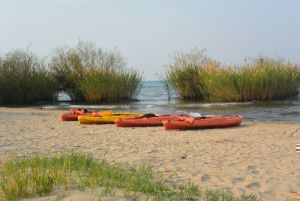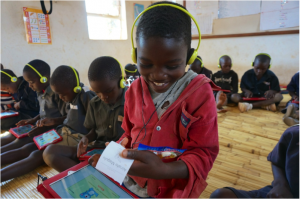10 reasons to visit… Malawi
Today’s post is by Alex from onebillion. As you may know, onebillion are an organisation set up by Jamie and Andrew from EuroTalk to provide basic maths, reading and English teaching through apps to children in developing countries (and they were recently featured in a BBC Click report). A few weeks ago, the whole onebillion team travelled to the African country of Malawi to expand their project to a new school.
Perhaps Malawi might not seem like an obvious choice for a visit, but here are ten reasons why Alex thinks you should give it a try 🙂
1. ‘Interesting’ foods
I’m not sure if this is a reason to visit Malawi or not, but it is quite interesting to see what some of the locals eat. Typical local cuisine mainly consists of a maize porridge called nsima, which they eat 2-3 times a day, but you can buy great-looking fresh fruits for next to nothing. You can also get international cuisine from some restaurants in Lilongwe or Blantyre (the two major cities). But a particular highlight is seeing the ‘mouse boys’ who sell sun-dried mice on sticks (complete with fur) on the side of the road. For some reason none of us has been brave enough to try one yet. You also have to drink some fresh-ground Malawian coffee – and bring back some beans for the EuroTalk and onebillion offices, of course!
2. Lake Malawi
This is one place you have to see before you die. The most beautiful place I’ve ever been to. You can stay in a simple straw beach hut, see the stars and wake up to the sound of the waves and nothing else. The lake is home to many varieties of fish, alligators and hippos, and we saw dozens of monkeys and other critters all around the lake. Including some rather terrifying new species of bugs. Be careful to check whether it’s safe to swim in the part of the lake you visit, but even if you can’t it’s an amazing place to see some stunning nature.
3. Get involved in a voluntary project
onebillion recently returned to Malawi to check up on our progress with delivering tablet-based learning in Biwi school and to expand to another, larger school. We were so excited to see how much progress the children have made with their maths skills. But there are many other organisations working there on things like building schools, digging wells and volunteering as a teacher or healthcare assistant. See Malawi Volunteer Organisation or VSO, for example.
4. See a totally different way of life
Even in Lilongwe, the capital, Malawi is not very developed. You’ll be bumping along mud roads and seeing people walk past with bicycles stacked up with insane quantities of firewood, huge towers of mud bricks being baked dry and barefooted children running around with chickens and goats. Just seeing how people go about their daily lives will give you a new perspective, and chatting to some of the locals and children who have never seen technology such as smartphones or tablets is really worthwhile. Seeing the faces of groups of Malawian children when they first play a maths game on a tablet or seeing our flying ‘drone’ camera was priceless.
5. Experience life without modern conveniences
You know all those things you take for granted, like running water, drinking water on tap, electric lights, flushing loos, wifi? Maybe try a couple of days in a traditional Malawian-style hut and say goodbye to all of those things for a while! Whilst freezing ‘showers’ from a bucket, candlelight and a few days without Instagram might be hard to get used to – it’s a really interesting experience which makes you appreciate all the home comforts you took for granted before. And you might find you see and experience something new when you’re forced to go without Facebook for a couple of days. Kumbali Village in Lilongwe is the perfect way to experience a back-to-basics stay but with clean water available and clean rooms too.
6. Wildlife!
One of the first things you’ll notice as you take a walk or drive around when you arrive in Malawi is all the different plants and animals that you’ll see everywhere. You can take a safari (the Swahili word for ‘journey’ by the way) or visit one of the country’s incredible national parks, such as Liwonde and Lengwe to see hippos, lions, elephants and more. But you’re likely to spot monkeys, baboons, colourful insects and birds just out and about. Just watch out for chickens, goats and dogs running in front of your car when you’re in one of the villages!
7. Climb Mount Mulanje
I didn’t actually do this when I visited, but Zane and Alan from onebillion did on their visit and said it gave them a really great sense of achievement, as well as an awesome view. Mt Mulanje is 9,849 feet high – quite a climb, but not requiring special equipment or training.
8. Friendly people
We often say this about a place, but in Malawi it really is true! Malawi is called the ‘warm heart of Africa’ and much of this is to do with how warm and friendly people are. They are really genuinely interested to talk to people from other places and happy to share their lives and interests with you in return. They’re also really happy if you manage a couple of simple Chichewa phrases: greet people with ‘moni’ (hello), say ‘zikomo’ (thanks) and ‘chonde’ (please) and you’ll get along fine.
9. Unspoiled landscape and scenery
Depending on the time of year, Malawi is either lush and green or dry and very dusty. However it is always a very impressive country to see, with a variety of different terrains and landscapes, including mountains, lakes and rivers. There are a lot of open spaces and not many tourists, so it’s a great place to see some real and unspoiled nature where commercialism hasn’t taken over yet.
10. The climate!
Ok, since our trips to Malawi are mainly about working on our ‘one billion children’ project we don’t have sooo much time for sunbathing. We’re normally up with the sunrise at 5.30am, in school all day and up charging and configuring tablets, processing data or marking until about 11. But there’s normally some time to relax as well, and sunbathing might also happen (only if our work is done first, honest). You might think of Malawi as extremely hot, but most of the year it is a really nice temperature around 30 degrees and not too humid. Remember your suncream (and insect repellent!) and it really is a great place to soak up some sun.
Alex
Junior Language Challenge – the semi-finals!
Back in March, over 1,100 primary school children from around the UK joined our annual competition, the Junior Language Challenge, learning Italian online. Over the next three months, they scored points in the language games, and then in June the top scorers from each region of the country progressed to the second round.
Not wanting to make it too easy, for their next challenge we asked them to learn the notoriously tricky language of Japanese. Impossible, you might say – how can you expect children under 11 to learn such a difficult language?
As we discovered this week, it’s not impossible at all. Over the last ten days, we’ve been travelling around the country for the regional semi-finals, and have been seriously impressed with what we’ve seen. All the children had clearly worked really hard, and we had several very tense contests in the race to grab a place in the final. There were some familiar faces, and some first-time competitors, and everyone gave it their all. So on behalf of EuroTalk, thank you to all the teachers, parents and most importantly, the children for joining in so enthusiastically.
The competition also raised nearly £6,000 for a brilliant organisation called onebillion, who create apps to teach children in developing countries basic maths and reading, giving them valuable learning opportunities that we often take for granted here in the UK. onebillion were recently featured by BBC Click, and their report gives you a taster of the fantastic work they’re doing in Malawi.
But what about our finalists? They’re not finished yet. For their third and final language, they’ll be learning the African language of Somali, ready for the grand final in London next month, where they’ll compete for the title of Junior Language Challenge Champion 2014, and a family holiday to Africa.
We hope that everyone who’s taken part in the JLC this year, whether you’re continuing on to the final or not, really enjoyed it. Now you know that you can learn any language, even difficult ones, the sky’s the limit!
And to our finalists… see you next month 🙂
An update from Malawi
As you may know, EuroTalk have been working for several years towards the goal of bringing the best possible education to one billion children in developing countries. This work is something we’re very passionate about, and so we’re excited to announce the birth of onebillion, a charitable organisation set up by Jamie and Andrew from EuroTalk to focus solely on making this vision a reality. EuroTalk are proud to support onebillion as they continue their vital work, and we’ll be bringing you regular updates and news on what they’ve been up to.
So for today’s post, it’s over to Alex for an update from Malawi:
Over here at onebillion, we’re working hard on producing the final six topics for Maths, age 4-6, writing and programming a practice app to accompany Maths, age 3-5 and planning a whole lot of new Learn to Read and Letters and Sounds material. We’re also making progress, slowly but surely, towards expanding our Masamu (maths) project throughout all 5,000 schools in Malawi!
So, what have we been up to in Malawi recently? Well, first and foremost, we’re in the process of looking for a second school in which to implement our Masamu intervention. This has been running successfully at Biwi school in Lilongwe for almost a year now and an independent study by the University of Nottingham has shown that using the apps for as little as eight weeks can drastically increase children’s level of maths knowledge. So Andrew and Jamie have spent a couple of days at Ngwenya school, also in Lilongwe, to assess its suitability as a second school for us to get working in. Ngwenya seems to be a well-organised school, and even has desks in its classrooms! However it is a huge school with 5,000 pupils in total – meaning it will pose some challenges in terms of scaling our current intervention.
Work is already under way to construct a new learning centre in the school, like the one we’ve been using at Biwi, where the children will have a dedicated space to come and work in, and there will be somewhere to store and charge the ipads.
Speaking of charging the devices, we’ve also been road-testing solar-powered charging to allow large quantities of iPads to be charged even in rural schools which may not have electricity. Biwi school has access to a power socket in the head teacher’s office, but this is restricted to just the one room, and even this is fairly uncommon in Malawian schools, so finding an alternative way to charge the devices was really important to us, and will continue to be as we look at scaling further afield in other parts of Africa.

Our solar charging stations have been working great so far, and are simple for the teachers to use.
We’ve also just implemented our brand-new battery-powered, low-cost printers at Biwi. These allow the children to immediately print their certificates which they win as they complete each topic within the Masamu apps. These are printed on a cheap and durable receipt-style paper, which is a simple and low-cost way for the children to see the results of their hard work, and the teachers to keep records of their achievements. This will work hand in hand with our new server version of the apps, which was the main purpose of Jamie and Andrew’s visit. It allows us to receive data from schools in Malawi almost instantly, keeping us up-to-date on which children have completed which topics, and their results. Hopefully we’ll start to receive data from the server within the next week or so, and will be able to see the apps being used in real time.
So it’s onwards and upwards in the onebillion office, and we’re really excited to see results coming in from Biwi school and to get our Masamu apps into Ngwenya school. We’re also hoping to get some new topics ready in Chichewa within the next couple of months, which will extend the current Masamu 4-6 app from twelve to eighteen topics!
You can find onebillion at onebillion.org.uk, like us on Facebook or follow us on Twitter @1bnchildren for news, updates and pictures from Malawi.
Alex
Languages at primary school – what’s the point?
From September this year, it’s going to be compulsory for primary schools in the UK to teach a foreign language. This is causing quite a lot of stress for schools, according to a report published earlier this week, which says that 29% of teachers don’t feel confident about teaching a language to their students. That’s hardly surprising, considering many teachers haven’t studied languages themselves since their GCSEs, which for some will have been quite a while ago.
But despite this, the report says, 85% of primary schools have said they believe making languages a requirement is a good move, and many are already tackling the situation head on by introducing languages before it’s required by law.
 So what exactly is the point of teaching languages at such a young age? Many people will argue that the curriculum for children is already too full, with a need for English, maths and science, as well as citizenship, history and physical education, to name just a few. Why squeeze in yet another subject, especially in a world where many people believe that ‘everyone speaks English’?
So what exactly is the point of teaching languages at such a young age? Many people will argue that the curriculum for children is already too full, with a need for English, maths and science, as well as citizenship, history and physical education, to name just a few. Why squeeze in yet another subject, especially in a world where many people believe that ‘everyone speaks English’?
Learning a language is good for your brain
Well firstly, learning a language can actually make you smarter. The positive effects are well documented – bilingualism makes you better at problem solving, planning and verbal reasoning. Research by psychologists at Penn State University has shown that if you’re bilingual, you’re likely to be better at multi-tasking, because your brain is used to ‘mental juggling’. And other studies have shown that learning another language can help to delay the onset of dementia in later life.
It makes you better at your native language
Studying a second language helps you to understand your own, because it makes you think about how language is formed. Because I grew up speaking English, I don’t really remember learning the rules of the language; they just came naturally. But when I took up Spanish, suddenly I needed to think about grammar, and about how I was structuring sentences, which is much more important in Spanish than in English. For example, in Spanish you can’t end a sentence with a preposition, which made me realise how often I was getting away with this in English. And I would never have even known the subjunctive existed if not for my Spanish studies (although I’m not going to lie and say I use the subjunctive regularly in English!).
Learning a language prepares you for the rest of your life
I don’t just mean learning languages at secondary school, although it’s likely that children who leave primary school with some knowledge of another language will want to continue it when they move on. I mean beyond school – when the time comes to choose degree courses and, even more importantly, find a job. A recent article in The Economist says that employees with a language in the U.S. can earn on average 2% extra, which may not sound like much, but over time can add up to some serious money. Not only that but learning a language will make it easier for you people to go travelling and see the world; it might even help you find the love of your life!
The younger, the better
It’s a common argument that children are better at learning languages than adults; because of the way the brain develops, some scientists believe there’s a ‘critical period‘ for language acquisition. And although there’s plenty of evidence that this might not necessarily be the case (just look at Benny Lewis, who didn’t start learning languages until adulthood, and now speaks twelve languages fluently), I do think there’s something in it; after all children are constantly learning new things, so one more probably won’t phase them. And they’re also in a better position to learn than adults, who are very good at finding other things to do and worry about. (I know I am.)
It’s fun!
Some people might disagree with me here, looking back on their own language classes at school with its endless repetition of vocabulary and verb conjugations. Obviously I’m biased, but I do think learning to speak another language can be really fun if it’s put across in the right way. There are so many exciting ways to teach a language, from songs and TV shows to games and apps. The internet is full of great ideas – have a look at #mfltwitterati on Twitter as a good starting point.
Or check out the Junior Language Challenge, EuroTalk’s national competition for children aged 10 and under across the UK – it’s great fun for children, makes life easy for teachers and raises money for charity all at the same time. Just the other day we received a message from one of our 2013 finalists, who said, ‘It was a great adventure. It’s now set me off to learning languages from all over the world.’
Liz
Why learn Mandarin Chinese?
In Europe and the United States alike, a growing interest in Mandarin Chinese is leading to big changes in public and private education, with various schools for adults and children now incorporating this language into their curriculum. Many parents are currently encouraging their children, aged as young as four or five, to learn Mandarin, in an attempt to boost their prospects in the face of an increasingly competitive workforce.
Chinese growth
Despite a marked increase in popularity of Mandarin Chinese, it is interesting to view a spate of news articles and blogs advising adults and children alike not to bother learning this challenging language. Fluency in this language is impossible, their authors say, without spending many years in China; Mandarin (which utilises over 2,000 characters) is too difficult to learn in one’s free time; the tonality of the language (an array of pitches are used to convey different meanings) is a hurdle most students will fail to overcome. Even eight hours weekly spent on the subject, they claim, is not enough for top-grade fluency to be achieved.
Yet the statistics cannot be argued with: currently, some 40 million foreign students are studying Mandarin in China and by the year 2020, the Chinese government predicts that this number will rise to 100 million. According to Malaysia-chronicle.com, ‘China is now the number one producer of wind and solar power in the entire globe’. It is also the number one nation in the world in terms of trading when import and export totals are added; it boasts more foreign currency reserves than any other country; China consumes more energy than the U.S. and is the leading manufacturer of goods. There is no doubt that the study of the Chinese language can open many doors, many of which are simply not immediately foreseeable. Owing precisely to the difficulty of Chinese, children have a better chance at achieving a good conversational level if they start young. Moreover, bilingualism is not the only valid goal for budding students; even having an intermediate speaking level can go a long way in sectors such as the tourism industry.
Increase in Chinese tourism
Recent developments show the growth of Chinese investment in Europe. In late 2013, Chinese Premier, Li Keqiang, attended a Sino-CEE summit in Romania, where he and dignitaries from 16 other countries pledged to forge tighter economic ties in the near future. Chinese tourism to Europe is also on the rise, with countries like Spain receiving some 33 per cent more visitors in 2013 than in 2012. Many Chinese tourists favour countries like Spain and Italy as popular tourist destinations. As noted by planetcruise.co.uk, the Mediterranean is one of the ‘most popular cruising destinations’ for tourists from across the globe. In addition to economic reasons, there are more factors attracting children and adults alike to hone their skills in Mandarin. Recent studies indicate that speaking this language has an entirely different effect on the brain than speaking other languages. The study, undertaken by researchers at the Wellcome Trust in the UK, has revealed that the tones, sound and complicated characters used in Mandarin Chinese employ both temporal lobes in the brain (speakers use only the left temporal lobe for the English language). As Languageboat.com states, ‘learning Chinese may train a host of cognitive abilities not utilised in the study of other languages’.
It is hardly a source of surprise to find that learning Mandarin has such vastly different effects on the brain than other languages, all of which descend from a system developed in Mesopotamia thousands of years ago. The origins of the Chinese language are of a completely different nature and although learning this language for the first time can undoubtedly be time-consuming and challenging, it is also an entertaining and, some would say, beautiful, melodic way to boost one’s economic future and brain power.
Eve Pearce


















